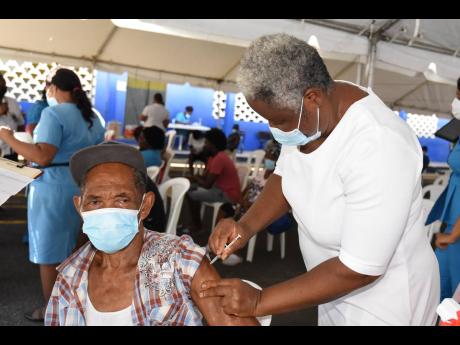Mu is here
But CMO cautions that Delta still main COVID threat
Just over a week after the World Health Organization (WHO) designated the Mu strain of COVID-19 a “variant of interest”, Jamaica confirmed 26 cases on Thursday, triggering concern locally about its potential to evade protection provided by vaccines.
The revelation was made by Minister of Health and Wellness Dr Christopher Tufton at Thursday evening’s COVID Conversations press briefing.
But Chief Medical Officer (CMO) Dr Jacquiline Bisasor-McKenzie was swift to point out that while Mu has the “potential to cause problems” and is being monitored closely, the Delta variant remains the predominant strain among the population.
Of the 92 samples sent to the United States’ Centers for Disease Control and Prevention on August 21 for testing, 55 returned positive for Delta, 26 for Mu, and the remaining 11 samples for the SARS-CoV-2 virus.
The CMO could not give details on the 26 samples of interest, noting that analysis is yet to be done to determine identities, ages, addresses, and time ranges.
Bisasor-McKenzie said that while Mu has the “potential of increased immune escape” - meaning that it could evade the body’s attempt to destroy the virus and to produce antibodies - the variant was still being investigated.
“The WHO has said that preliminary evidence suggests that the Mu variant could partially evade the antibodies we get from vaccination. So this is even more reason why it is that we need to decrease exposure,” she said.
Tufton, in the meantime, said that while the announcement of the new COVID-19 strain is already creating “anxiety and some panic”, Jamaicans should recognise that it was very difficult to keep variants out of an open society.
Warning that the consequences of full closure of the country’s borders would be very significant, Tufton advised Jamaicans to anticipate the emergence and influx of more strains.
“We should not panic about them even though we will screen to avoid or reduce and test. What we should continue to do is observe protocols, continue to take the vaccines, and build our capacity to resist as we restore some semblance of normality,” said Tufton.
Approximately 15 per cent of the 453,543 Jamaicans who received first doses did not return for second shots within the 12-week window. At the same time, 141,438 Jamaicans have received second doses, and 11,305 have taken the one-shot Johnson & Johnson, bringing the total number of people who have received one or more shots to 606,286. More than 152,740 persons, or 5.4 per cent of the population, are fully vaccinated.
Meanwhile, the CMO disclosed that five per cent of children aged zero to nine, and 7.7 per cent of those aged 10 to 19, have tested positive for the virus.
Three children in the zero to nine age group died as a result of contracting the virus, representing 0.2 per cent of deaths. Eight deaths have so far been recorded for children aged 10 to 19.
Bisasor-McKenzie could not provide the figure for the number of children hospitalised.
As data continue to pour in, August has the ignominy of the deadliest month of the pandemic. Three hundred and ninety-one deaths have been confirmed for August, national epidemiologist Dr Karen Webster-Kerr told The Gleaner on Thursday. Approximately 80 other deaths in August are under investigation. August 26 was the deadliest day, with 21 fatalities.
Jamaica has recorded 74,007 coronavirus infections and 1,685 deaths.

